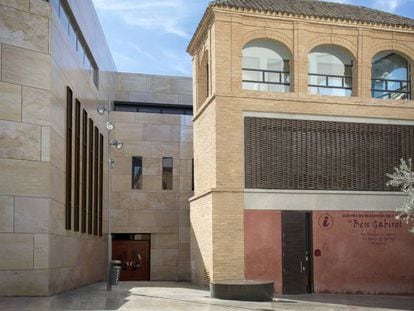Thousands of Sephardic applications for Spanish nationality denied following fraud alert
Some Jewish associations have accused the government of anti-Semitism, while others argue the rejected requests did not meet the legal requirements

/cloudfront-eu-central-1.images.arcpublishing.com/prisa/M5R3UL74ZJBMPIA2FD3HXSGL6U.jpg)
It was a police report sent to the Spanish Justice Ministry at the end of 2018 that set alarm bells ringing. The document warned of the existence of a criminal organization and possible fraud relating to the concession of Spanish nationality to the descendants of Sephardic Jews.
In 2015, Spain passed the Sephardic ancestry law, which grants Spanish nationality to the descendants of Jews expelled in 1492 by Queen Isabella and King Ferdinand, without requiring them to give up their other passports. The law, driven by then-justice minister Alberto Ruiz-Gallardón of the conservative Popular Party (PP), looked to offer “historical redress” for Sephardic Jews, whose descendants are spread out across the world.
In 2021, 15,274 applications were approved, but 3,019 were refused
To be granted a Spanish passport, an applicant needed to provide proof of their Sephardic ancestry with a certificate from the Sephardic Jew community of their country of birth or residence and certify their link with Spain. Under the law, compiling and verifying the documents falls to public notaries, while the Justice Ministry is responsible for reviewing the final application, doing a criminal background check and approving the request.
But the police alert in 2018, which came from a Spanish embassy in a Latin American country, changed the way these applications were reviewed: public officials began to study each request under a microscope and a huge number were denied after it was discovered that they did not meet the legal requirements. In 2021, 15,274 applications were approved, but 3,019 were refused.
The wave of denials has sparked criticism from some Sephardic Jewish communities and a handful of lawyers, who accuse the Spanish government – led by a coalition between the Socialist Party (PSOE) and junior partner Unidas Podemos – of anti-Semitism.
Up until the police alert, those seeking Spanish nationality as the descendants of Sephardic Jews had little trouble. As of 2020, 20,908 requests had been approved and just one denied, according to data from the Justice Ministry.
But sources from the Justice Ministry admit that after the warning was sounded, it was discovered that thousands of people had filed requests without meeting all the requirements. In some cases, the applicant had provided an ancestry certificate from a Sephardic Jewish community in a country they had no links to i.e. it was not their place of birth or residence. And in other cases, they issued their request by proxy instead of by person, as is demanded by the law. The requests had passed the initial filter of the public notaries and the department of the Justice Ministry responsible for granting nationality, which is chronically understaffed with little more than 30 staff members, ended up approving passports after only verifying the applicant’s criminal record.
Recognizing that the process could be improved, it was decided, according to the same sources from the Justice Ministry, to prioritize the approval of solid requests and sideline those that were more questionable. Public notaries were also sent a notice in October 2020 that warned them of the problems detected in the notarized certificates and called on them to take extreme care when accepting documents. A hundred public workers were hired to process these and other requests for Spanish nationality, which allowed each case to be studied in greater detail. As a result of this added scrutiny, many more applications were denied.
We believe the Justice Ministry is simply rejecting the requests because they don’t want Sephardic Jews becoming citizensSara Koplik, from the Jewish Federation of New Mexico
One of the main reasons why these requests were denied was because the applicant presented a certificate of Sephardic ancestry from a country they have no relationship with. Many of the denied applications, for example, included certificates from the Jewish Federation of New Mexico in the United States, which confirmed it issued 20,000 such documents to individuals in Latin America.
Indeed, this organization is among those that have spoken out against the high volume of denials, accusing the government of anti-Semitism. “We believe the Justice Ministry is not examining the cases carefully and is simply rejecting the requests because they don’t want Sephardic Jews becoming citizens,” said Sara Koplik, the head of the Sephardic ancestry program at the Jewish Federation of New Mexico.
Lawyers and notaries have also accused the government of introducing new criteria and questioning the work of Sephardic Jew communities and notaries. “They are accusing us of fraud and it’s not true,” said Luis Portero, a lawyer who participated in the negotiation of the Sephardic ancestry law, who has seen 600 of his clients’ applications rejected. According to the Justice Ministry, “the criteria have not changed and they are in the law.”
The Spanish Federation of Jewish Communities, which has the authority to issue Sephardic ancestry certificates to anyone, regardless of where they are, has also rejected the accusations of anti-Semitism. “The resolutions of the requests have never been conditioned by political decisions, as some seek to imply, but rather by following the law,” said a spokesperson from the federation. “If the applications do not meet the requisites of the law, are not properly presented or have incorrect documentation, it’s normal that they would be denied.” The federation adds that the concession of Spanish nationality is not based on religious domination, but rather Spanish-Jewish ancestry, pointing out that many non-Jewish people have been granted a Spanish passport.
Alberto de Lara Bendahan, a lawyer who has spent years helping the descendants of Sephardic Jews apply for Spanish nationality, also believes the accusations have no basis, arguing more diligence was long overdue. “It trusted the criteria of the notary, who was the person who assessed the eligibility of the documentation; and the ministry laxly approved them,” he said.
The deadline for descendants to apply for Spanish nationality was September 30, 2019, but the coronavirus pandemic has given them a small margin of extra time. In total, since the law was passed, Spain has received 63,873 requests and approved 36,168, most between 2020 and 2021. Another 50,000 applications whose documents must be reviewed by a notary – now with extra care – are still being processed.
English version by Melissa Kitson.











































